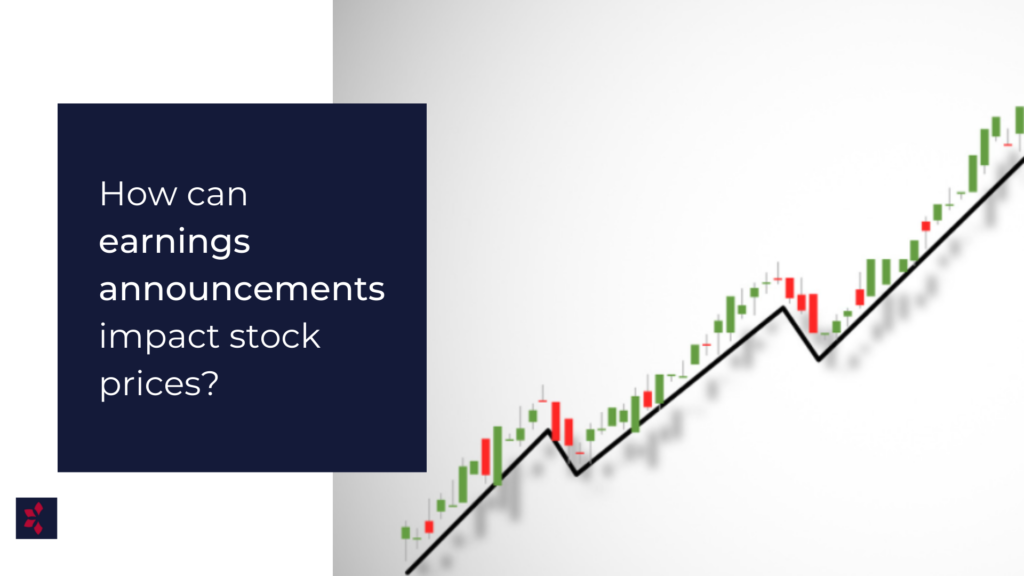How Can Earnings Announcements Impact Stock Prices?

Every quarter, “earnings season” is an important time when investors can check to see if companies’ fundamentals continue to support the prices of their held stocks. Investors can also consider whether to take on new positions to capitalize on potential positive price movements based on new information in the quarterly release.
Long-term investors may not be swayed by a quarter or two of below-target earnings or analyst expectations for a specific company, but quarterly earnings analysis is vital for fundamental investing to gauge the future trajectory of a company’s performance.
In this article, we discuss how earnings announcements can impact stock prices so that you are informed. If you are a long-term investor yourself, earnings season can be a great way to validate your investment thesis! Now, let’s dive into the importance of earnings season and how earnings announcements can impact your investment decisions.
Earnings Season—Why Is It So Important?
Public companies are required to keep investors (and the public) informed about their financial health. Earnings season is the period each quarter when most public companies disclose their quarterly earnings, often via conference calls. While these results indicate how a company performed during the most recent quarter, they also can provide some insight into how the company is positioned to tackle future quarters.
Comments that senior managements make on earnings calls can also be qualitative indicators of risks and opportunities ahead that you may wish to be mindful of—for instance, if someone in upper-level management is rumored to be leaving the company shortly.
As you can imagine, it is important for investors to be focused on these results, listen to the company’s conference call if it is hosting one and to really understand and analyze the future earnings potential for the company.
What Is The Reaction In The Market Of A Company’s Stock Price When Its Earnings Track With Expectations?
Stock markets are a forward-looking mechanism—current valuations reflect expected future earnings. This means that holistically speaking, at any point in time, current prices take account of expectations based on all information already known at that point in time (just as you would buy a stock because current information helps you to form a positive assessment of the future prospects of the company and you therefore believe that its stock price will go up). As those expectations change, markets adjust accordingly.
With that in mind, so long as a company’s earnings track with previous expectations, the earnings announcement will have little to no impact on the stock’s market price.
What Can Happen To A Company’s Stock Price When Its Earnings Don’t Track With Expectations?
On the other hand, a company’s actual quarterly earnings can vary significantly from earlier projections—what is known as “earnings surprises.” In such cases, if the company reports earnings that exceed expectations, its stock price tends to rise; if the company reports earnings significantly below expectations, its stock price tends to fall.
What may seem intuitive in this case, can certainly be counter-intuitive at times.
For instance, you may expect a company announcing positive earnings of $2.50 per share to increase in value , which should positively impact stock prices. However, what matters is the expectations of analysts, and therefore, if analysts had projected the earnings to be $3.50 per share, there is a tendency for the stock price to fall because the company’s earnings announcement did not meet analyst expectations—good investing knowledge to have!
The Ripple Effect
It is important to note that even if you do not act based on earnings announcements, other investors may do so, and as a ripple effect, their actions can affect the price of a company that you hold a position in.
For instance, if an earnings announcement is only slightly below expectations, some investors may be prepared to adopt a wait-and-see approach, whereas others may be prompted to sell the stock. The mechanics of supply and demand mean that significant sell-offs can result in a decrease in stock prices, sometimes out of proportion to the modest dip which you would expect from the minor earnings miss.
The Bottom Line
While you, as a long-term investor, may avoid making decisions based on short-term information provided during earnings season, it is important to understand how such information impacts the price of your investments and how it may flow between market participants, ultimately impacting how the stock trades and potentially the performance of the broader stock market. Staying up to date and watching how earnings unfold can certainly make you a more informed investor overall.
This content is provided for general informational purposes only and does not constitute financial, investment, tax, legal or accounting advice nor does it constitute an offer or solicitation to buy or sell any securities referred to. Individual circumstances and current events are critical to sound investment planning; anyone wishing to act on this content should consult with his or her financial partner or advisor.